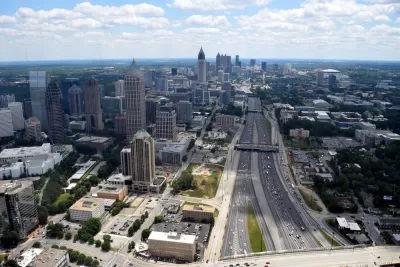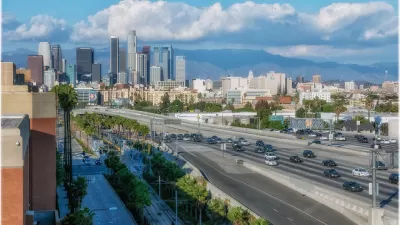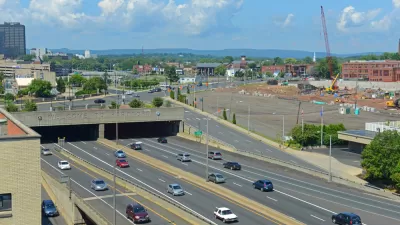A thorough and damning indictment of 20th century land use and infrastructure planning, and its contemporary legacy of segregation and congestion.

Kevin M. Kruse starts a big feature on the segregationist purposes of 20th century urban freeway planning by noting the terrible traffic conditions in Atlanta. The traffic is a result of the deliberate design of a system meant to segregate white populations from black, according to Kruse.
"In Atlanta, as in dozens of cities across America, daily congestion is a direct consequence of a century-long effort to segregate the races."
While the federal government paid for most of the creation of the Interstate highway system during the 1950s and 1960s, local officials had a lot of power in determining the path of urban freeways.
"As in most American cities in the decades after the Second World War, the new highways in Atlanta — local expressways at first, then Interstates — were steered along routes that bulldozed 'blighted' neighborhoods that housed its poorest residents, almost always racial minorities," according to Kruse. The story is repeated in other cities like Jacksonville, Miami, Nashville, New Orleans, Richmond, and Tampa, but also other cities around the country, like Chicago, Cincinnati, Denver, Detroit, Indianapolis, Los Angeles, Milwaukee, Pittsburgh, St. Louis, Syracuse, and Washington.
Interstates were a tool of urban renewal, destroying black and low-income neighborhoods, but also as a toll of segregation. Kruse explains:
"Today, major roads and highways serve as stark dividing lines between black and white sections in cities like Buffalo, Hartford, Kansas City, Milwaukee, Pittsburgh and St. Louis. In Atlanta, the intent to segregate was crystal clear. Interstate 20, the east-west corridor that connects with I-75 and I-85 in Atlanta’s center, was deliberately plotted along a winding route in the late 1950s to serve, in the words of Mayor Bill Hartsfield, as “the boundary between the white and Negro communities” on the west side of town."
The story told by Kruse continues, with worsening congestion in the Atlanta region and the obstinate opposition of white suburban neighborhoods to public transit. That part of story continues to this day, as Gwinnett County voted MARTA funding down yet again earlier this year.
FULL STORY: What does a traffic jam in Atlanta have to do with segregation? Quite a lot.

Maui's Vacation Rental Debate Turns Ugly
Verbal attacks, misinformation campaigns and fistfights plague a high-stakes debate to convert thousands of vacation rentals into long-term housing.

Planetizen Federal Action Tracker
A weekly monitor of how Trump’s orders and actions are impacting planners and planning in America.

San Francisco Suspends Traffic Calming Amidst Record Deaths
Citing “a challenging fiscal landscape,” the city will cease the program on the heels of 42 traffic deaths, including 24 pedestrians.

Defunct Pittsburgh Power Plant to Become Residential Tower
A decommissioned steam heat plant will be redeveloped into almost 100 affordable housing units.

Trump Prompts Restructuring of Transportation Research Board in “Unprecedented Overreach”
The TRB has eliminated more than half of its committees including those focused on climate, equity, and cities.

Amtrak Rolls Out New Orleans to Alabama “Mardi Gras” Train
The new service will operate morning and evening departures between Mobile and New Orleans.
Urban Design for Planners 1: Software Tools
This six-course series explores essential urban design concepts using open source software and equips planners with the tools they need to participate fully in the urban design process.
Planning for Universal Design
Learn the tools for implementing Universal Design in planning regulations.
Heyer Gruel & Associates PA
JM Goldson LLC
Custer County Colorado
City of Camden Redevelopment Agency
City of Astoria
Transportation Research & Education Center (TREC) at Portland State University
Jefferson Parish Government
Camden Redevelopment Agency
City of Claremont





























